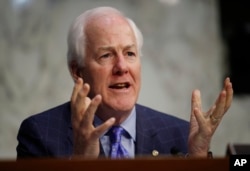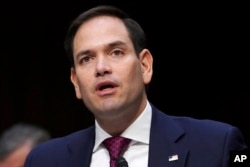U.S. President Donald Trump said on Wednesday “a different structure” is needed in trade negotiations with China, but he did not provide further details on the kind of change he seeks.
“Our trade deal with China is moving along nicely,” Trump said in his Twitter post Wednesday morning, “but in the end we will probably have to use a different structure in that this will be too hard to get done and to verify results after completion.”
The stock market reacted negatively after Trump cast doubt on trade negotiations with China but ultimately trimmed its losses, ending the day in the positive territory and gained 52.40 points, or 0.21 percent.
Trump said on Tuesday he was neither pleased nor satisfied with how the recent trade talks with China went, but added, “They’re a start.”
After two days of trade talks between the two countries in Washington last week, China agreed to “substantially reduce” the $375 billion annual trade surplus it has over the U.S. by buying more American goods, but there was no mention of any specific import and export targets in the statement agreed to by the two countries.
On Capitol Hill, concerns appear to be mounting on Trump’s approach to trade talks with China.
Republican Senator John Cornyn of Texas cautioned Wednesday that the United States needs to remain “steely-eyed” and make sure “China isn’t playing us for fools.”
Democratic Senator Debbie Stabenow of Michigan warned, “It's important we not only talk tough about China, but actually be tough with China.”
“I am really concerned about the president’s hemming and hawing over the last few days when it comes to China. I’m worried that President Xi [Jinping] is crafting a much better deal than President Trump,” Senate Minority Leader Chuck Schumer of New York said Tuesday.
On trade with China, Schumer added that he is “closer to the president’s view” than he was to the views of former Presidents Barack Obama or George W. Bush.
Republican Senator Marco Rubio of Florida, chairman of the Congressional-Executive Commission on China and a longtime critic of China, said Wednesday that the U.S. needs a “structural rebalance” of trade with China, not a “dollar rebalance.”
In a Twitter post, Rubio said he has urged Trump to “follow his initial instincts on China,” and he also asked Trump to “listen to those who understand that a short-term trade deal that sounds good but poses long-term danger is a bad deal.”
According to U.S. media reports, infighting between free-trade advocates and protectionists within Trump’s trade team has led to contradicting policy pronouncements and public statements on trade negotiations with China.
For example, U.S. Treasury Secretary Steven Mnuchin said the United States would hold off on imposing tariffs on China. But U.S. Trade Representative Robert Lighthizer said hours later the tariffs were still on the table. Earlier this month, White House trade adviser Peter Navarro, known for his protectionist views, reportedly feuded with Mnuchin on his approach to trade talks during their trip to Beijing.
The recent rounds of trade talks are aimed at avoiding a full-blown trade war between the United States and China.
In April, Trump imposed tariffs on $50 billion worth of Chinese goods, and the Chinese retaliated with tariffs of their own. Trump announced he had instructed the U.S. trade representative to consider whether tariffs on another $100 billion worth of Chinese goods would be appropriate following China's announcement.
Michael Bowman contributed to this report.






